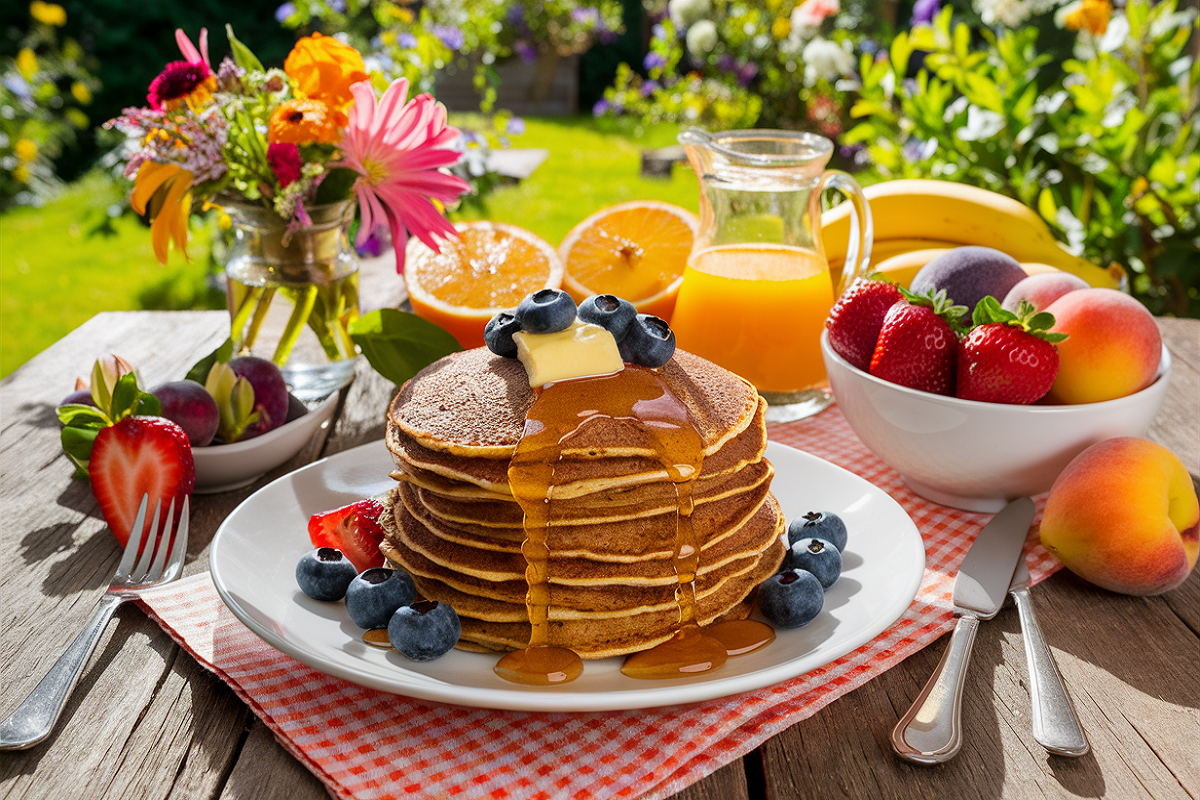
Introduction
Buckwheat pancakes, often overshadowed by their more common counterpart, traditional wheat pancakes, pack a punch when it comes to health benefits. This article delves into the reasons why buckwheat pancakes are good for you, exploring their nutritional profile, health benefits, and dietary compatibility. We’ll also share some tips for making perfect buckwheat pancakes, along with delicious recipes. Let’s get started!
What are Buckwheat Pancakes?
These breakfast treats, made from buckwheat flour, are a popular breakfast choice for those seeking a healthier alternative to traditional pancakes. Despite their name, buckwheat is not related to wheat. It’s actually a seed, making it naturally gluten-free. These pancakes have a distinctive, nutty flavor that sets them apart from regular pancakes.
Brief History of Buckwheat
Buckwheat has been cultivated for thousands of years, with its origins tracing back to Southeast Asia. Over time, it spread to Europe and eventually to North America. Historically, buckwheat was a staple in many cultures due to its resilience in poor soil conditions and its nutritional benefits. Today, it’s celebrated not only for its health benefits but also for its versatility in cooking.
Nutritional Benefits of Buckwheat Pancakes
Rich in Essential Nutrients
Buckwheat pancakes are a powerhouse of essential nutrients. These foods contain essential nutrients like magnesium, iron, and zinc, providing a rich source of vitamins and minerals. Additionally, they provide B vitamins, which are crucial for energy production and maintaining a healthy metabolism.
High in Fiber and Protein
One of the standout features of buckwheat pancakes is their high fiber and protein content. Fiber aids in digestion and helps maintain a healthy gut, while protein is vital for muscle repair and growth. This combination makes buckwheat pancakes a satiating and nutritious breakfast option.
Low Glycemic Index
Buckwheat has a low glycemic index, meaning it releases glucose slowly into the bloodstream. This helps regulate blood sugar levels, making buckwheat pancakes an excellent choice for those with diabetes or anyone looking to avoid blood sugar spikes.
Gluten-Free Benefits
For those with celiac disease or gluten sensitivity, buckwheat pancakes are a safe and delicious alternative. Since buckwheat is naturally gluten-free, it eliminates the risk of adverse reactions associated with gluten consumption. Furthermore, it offers a hearty and satisfying flavor that doesn’t compromise on taste.
By understanding these nutritional benefits, it’s easy to see why incorporating These pancakes into your diet can be a smart and tasty choice.
Next, we’ll delve into the various health benefits that make buckwheat pancakes a fantastic addition to any diet. Stay tuned!
Health Benefits of Buckwheat Pancakes
Supports Digestive Health
Buckwheat pancakes are a boon for digestive health, thanks to their high fiber content. Fiber aids in maintaining digestive health by encouraging regular bowel movements and preventing constipation, ensuring the smooth functioning of the digestive system. Moreover, fiber serves as a prebiotic, nourishing the beneficial bacteria in the gastrointestinal tract. A healthy gut microbiome is crucial for overall health, impacting everything from immune function to mental well-being.
Promotes Heart Health
Consuming buckwheat pancakes can also benefit heart health. Buckwheat is rich in rutin, a flavonoid that has been shown to reduce blood pressure and lower cholesterol levels. High blood pressure and cholesterol are significant risk factors for heart disease, so including buckwheat in your diet can help mitigate these risks. Furthermore, the magnesium in buckwheat supports heart health by relaxing blood vessels and improving blood flow.
Aids in Weight Management
If you’re looking to manage your weight, buckwheat pancakes can be a helpful addition to your diet. The high fiber and protein content in buckwheat pancakes helps you feel full and satisfied, reducing the likelihood of overeating. Fiber slows down digestion, keeping you full longer, while protein boosts satiety and helps maintain muscle mass during weight loss. Together, these factors can contribute to a balanced and sustainable weight management plan.
Enhances Blood Sugar Control
The low glycemic index of buckwheat makes it an ideal food for enhancing blood sugar control. Consuming foods with a low glycemic index (GI) gradually releases glucose, thereby averting abrupt increases in blood sugar levels. This is particularly beneficial for people with diabetes, as it helps maintain stable blood sugar levels. Including buckwheat pancakes in your diet can help manage blood sugar and reduce the risk of developing type 2 diabetes.
By incorporating buckwheat pancakes into your diet, you can enjoy a range of health benefits that support overall well-being. Whether you’re looking to improve your digestive health, support heart health, manage your weight, or enhance blood sugar control, buckwheat pancakes are a delicious and nutritious choice.
Dietary Considerations
Dietary Compatibility
Suitable for Gluten-Free Diets
Buckwheat pancakes are a fantastic option for those following a gluten-free diet. Since buckwheat is naturally gluten-free, it’s an excellent alternative for people with celiac disease or gluten sensitivity. Including buckwheat pancakes in a gluten-free diet can add much-needed variety and nutrition. This ensures that those avoiding gluten don’t miss out on essential nutrients, often found lacking in gluten-free diets.
Vegan and Vegetarian Options
Buckwheat pancakes can easily be adapted to suit vegan and vegetarian diets. By substituting dairy milk with plant-based milk (like almond or soy milk) and using flax eggs or chia seeds instead of eggs, you can create a delicious vegan version. Additionally, you can top these pancakes with a variety of vegan-friendly options, such as fresh fruits, nuts, and pure maple syrup, making them a versatile choice for breakfast.
Allergy-Friendly Benefits
Buckwheat itself is free from common allergens such as wheat, soy, and nuts. This makes buckwheat pancakes an excellent option for individuals with food allergies. However, it’s essential to be mindful of other ingredients used in the recipe. Always check labels to ensure that all components are allergen-free. For a truly allergy-friendly breakfast, choose toppings that are also safe for those with allergies.
Buckwheat vs. Traditional Pancakes
Nutritional Comparison
When comparing buckwheat pancakes to traditional wheat pancakes, buckwheat pancakes come out on top in terms of nutritional benefits. They are higher in fiber and protein, which contribute to a more balanced and satiating meal. Additionally, the vitamins and minerals found in buckwheat, such as magnesium and zinc, are often lacking in traditional pancakes made with refined wheat flour.
Taste and Texture Differences
These breakfast treats have a unique nutty flavor that sets them apart from the more neutral taste of traditional pancakes. This distinct flavor can be a delightful change for your taste buds. In terms of texture, buckwheat pancakes are typically denser and heartier, which some people find more satisfying. However, by combining buckwheat flour with other flours, you can achieve a lighter, fluffier texture if preferred.
Cooking and Preparation Variations
Preparing buckwheat pancakes is similar to making traditional pancakes, but there are a few key differences. It’s crucial to mix the batter until just combined to avoid overworking the buckwheat flour, which can result in dense pancakes. Letting the batter rest for a few minutes before cooking can also improve the texture. When cooking, use a non-stick skillet or griddle and cook over medium heat to ensure even browning.
By understanding these dietary considerations, you can see how These dishes can fit into various diets and offer a nutritious, allergy-friendly, and delicious alternative to traditional pancakes. Next, we’ll dive into some tips for making the perfect buckwheat pancakes and share some tasty recipes.
Cooking Tips and Recipes
Tips for Making Perfect Buckwheat Pancakes
Choosing the Right Ingredients
To make the best buckwheat pancakes, start with high-quality ingredients. Opt for organic buckwheat flour, which is less processed and retains more nutrients. You can also mix buckwheat flour with other flour like almond flour or gluten-free all-purpose flour to adjust the texture and flavor to your liking.
Mixing and Resting the Batter
When blending the batter, it’s crucial to avoid excessive mixing. Combine the wet and dry ingredients until just blended, leaving some lumps in the batter. Overmixing can lead to tough, rubbery pancakes. Additionally, let the batter rest for about 10-15 minutes before cooking. This process enables the flour to hydrate fully, yielding lighter and fluffier pancakes.
Cooking Techniques
Use a non-stick skillet or griddle preheated over medium heat. Lightly grease the cooking surface with vegetable oil or a non-dairy butter alternative. Pour the batter onto the skillet, using about ¼ cup for each pancake. Cook until bubbles form on the surface and the edges look set, then Flip the pancake and continue cooking for another 1-2 minutes until it turns golden brown. Serve immediately with your favorite toppings.
Delicious Buckwheat Pancake Recipes
Classic Buckwheat Pancakes
Ingredients:
- 1 cup buckwheat flour
- 1 tablespoon baking powder
- 1 tablespoon sugar
- 1 cup milk or plant-based milk
- 1 egg (or flax egg for vegan)
- 2 tablespoons melted butter or coconut oil
Instructions:
- In a large bowl, whisk together the buckwheat flour, baking powder, and sugar.
- In another bowl, combine the milk, egg, and melted butter.
- Gently pour the wet ingredients into the dry ones, stirring until they are just blended.
- Let the batter rest for 10 minutes.
- Before cooking, preheat a non-stick skillet over medium heat and lightly coat it with oil or butter.
- Pour ¼ cup of batter onto the skillet and cook until bubbles form on the surface.
- Flip the pancake and continue cooking for another 1-2 minutes until it turns golden brown.
- Serve with fresh fruit and pure maple syrup.
Vegan Buckwheat Pancakes
Ingredients:
- 1 cup buckwheat flour
- 1 tablespoon baking powder
- 1 tablespoon sugar
- 1 cup almond milk
- 1 flax egg (1 tablespoon ground flaxseed mixed with 3 tablespoons water)
- 2 tablespoons coconut oil, melted
Instructions:
- In a large bowl, whisk together the buckwheat flour, baking powder, and sugar.
- In another bowl, combine the almond milk, flax egg, and melted coconut oil.
- Combine the wet ingredients with the dry ones, stirring until they are just mixed.
- Let the batter rest for 10 minutes.
- Heat a non-stick skillet over medium heat and lightly coat it with oil or cooking spray.
- Pour ¼ cup of batter onto the skillet and cook until bubbles form on the surface.
- Turn over the pancake and continue cooking for an additional 1-2 minutes until it achieves a golden brown color.
- Present the pancakes with fresh berries and a gentle drizzle of maple syrup for a delightful finish.
Blueberry Buckwheat Pancakes
Ingredients:
- 1 cup buckwheat flour
- 1 tablespoon baking powder
- 1 tablespoon sugar
- 1 cup milk or plant-based milk
- 1 egg (or flax egg for vegan)
- 2 tablespoons melted butter or coconut oil
- 1 cup fresh blueberries
Instructions:
- In a large bowl, whisk together the buckwheat flour, baking powder, and sugar.
- In another bowl, combine the milk, egg, and melted butter.
- Combine the wet ingredients with the dry ingredients, stirring only until they are just mixed together.
- Fold in the fresh blueberries.
- Let the batter rest for 10 minutes.
- Before cooking, preheat a non-stick skillet over medium heat and lightly coat it with oil or cooking spray.
- Pour ¼ cup of batter onto the skillet and cook until bubbles form on the surface.
- Turn the pancake over and continue cooking for an additional 1-2 minutes until it’s golden brown on both sides.
- Serve with extra blueberries and a dollop of yogurt.
By following these tips and recipes, you can make perfect buckwheat pancakes that are delicious, nutritious, and suitable for various dietary needs.
Conclusion
Summary of Benefits
These breakfast treats are an exceptional choice for those seeking a nutritious and delicious breakfast. Their rich nutritional profile, high in essential nutrients like magnesium, iron, and zinc, provides numerous health benefits. The high fiber and protein content support digestive health and promote a feeling of fullness, which can aid in weight management. Furthermore, the low glycemic index of buckwheat helps regulate blood sugar levels, making these pancakes a smart choice for people with diabetes or those aiming to maintain steady energy levels throughout the day.
Encouragement to Try Buckwheat Pancakes
Incorporating buckwheat pancakes into your diet can offer a variety of health benefits, support diverse dietary needs, and provide a tasty alternative to traditional pancakes. Whether you’re following a gluten-free diet, seeking vegan options, or simply looking to add more nutritious foods to your meals, These breakfast treats are a versatile and satisfying choice. With the tips and recipes provided, you can easily make these pancakes at home and enjoy their unique, nutty flavor.
By understanding and appreciating the benefits of These pancakes, you can make an informed decision to include them in your breakfast routine. They not only offer substantial health advantages but also cater to various dietary preferences and restrictions. Give it a try, and discover how this simple yet nutritious food can enhance your diet and overall well-being.
This concludes the article on why buckwheat pancakes are good. I hope this comprehensive guide has provided valuable insights and practical tips for incorporating buckwheat pancakes into your diet. Enjoy your healthy and delicious breakfasts!
FAQs
Why are buckwheat pancakes so good?
Buckwheat pancakes are highly nutritious and offer a range of health benefits. They are rich in essential nutrients such as magnesium, iron, and zinc, which support various bodily functions. High in fiber and protein, these pancakes help promote digestive health and provide lasting satiety, aiding in weight management. Buckwheat has a low glycemic index, making it a suitable choice for regulating blood sugar levels and providing steady energy throughout the day. Additionally, buckwheat is naturally gluten-free, making these pancakes an excellent option for those with celiac disease or gluten sensitivities(Mayo Clinic).
How do buckwheat pancakes taste?
Buckwheat pancakes have a distinctive flavor that is often described as earthy and nutty, with a slightly bitter edge. This unique taste sets them apart from traditional wheat pancakes, which have a more neutral flavor. Some people enjoy the robust flavor of buckwheat pancakes, while others may prefer to blend buckwheat flour with other flour to achieve a more balanced taste. The texture of These pancakes is typically denser and heartier compared to regular pancakes.
How do buckwheat pancakes differ from traditional pancakes?
The primary differences between These pancakes and regular pancakes lie in their ingredients, nutritional content, and taste. Buckwheat pancakes are made with buckwheat flour, which is naturally gluten-free, while regular pancakes are usually made with wheat flour. Nutritionally, buckwheat pancakes offer more fiber, protein, and essential nutrients like magnesium and zinc. They also have a lower glycemic index, which helps in regulating blood sugar levels. In terms of taste, buckwheat pancakes have a nutty, earthy flavor, whereas regular pancakes have a milder, more neutral taste. The texture of buckwheat pancakes is often denser and more substantial compared to the light and fluffy texture of traditional pancakes.
What are the benefits of eating buckwheat?
Eating buckwheat provides numerous health benefits due to its rich nutritional profile. Buckwheat is high in fiber, which supports digestive health and helps maintain regular bowel movements. It is also a good source of plant-based protein, which is essential for muscle repair and growth. The presence of antioxidants, such as rutin, in buckwheat can help reduce inflammation and support heart health by lowering blood pressure and cholesterol levels. Additionally, buckwheat has a low glycemic index, making it beneficial for blood sugar control and reducing the risk of type 2 diabetes. Its gluten-free nature makes it a suitable option for those with celiac disease or gluten sensitivities.

